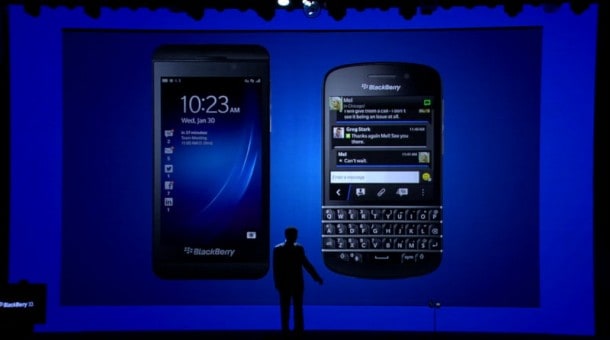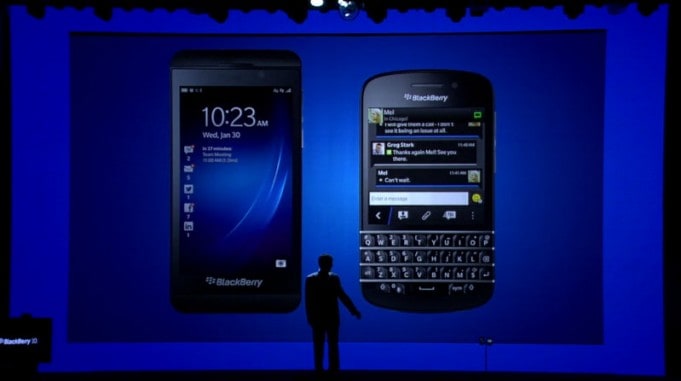
Yes, BlackBerry, the company formally known as RIM, demonstrated today that it can still build a quality device, and Alicia Keyes proved that she’s equally classy as she is drop-dead gorgeous. Yet BlackBerry forgot to bring something critical to today’s global party.
Granted, the Z10 is a slick looking smartphone. At $199 (on Verizon) it’s priced competitively. There’s plenty of apps at launch. Head of developer relations Alec Saunders said that the new BlackBerry World store features “the largest catalog of apps for a first-generation mobile platform.” And there’s some solid features (Flow, Peak, Hub) in the new touch-based BlackBerry 10 operating system. Clearly the company has its eyes set on Apple (iOS) and Google (Android).
But there’s one glaring omission:
Innovation.
Unfortunately, nothing announced or demo-ed today in New York by CEO Thornsten Heins and his team suggested this was a company looking to upend a market it once helped create. The Hub feature, for example, is a good place to start. It’s the lynchpin of almost any discussion or demo related to BlackBerry 10. Given the amount of social networking updates, emails, and messages we all receive throughout the day, this is not a bad thing. BlackBerry’s attempt to bring all this information into a single, easily accessible dashboard is rational. Google got it right a long time ago, and Android, with its swipe down notification bar still bests all comers (including Apple’s clumsy attempt to offer something similar in iOS). Staying on top of all the noise is essential to being productive So, yes, a Hub is certainly a nice feature. At this point in the game, however, it’s considered table stakes. We’ve moved beyond it. Likewise, most of the other new features we saw today were simply that: new features. There was not an ounce of innovation in the air or a jaw-dropping wowza. By that score, Heins does not even come close to Steve Jobs on a bad day. BlackBerry 10 is big news for the industry and the company itself, but that doesn’t mean it’s necessarily big news for consumers. It’s as if Heins rolled out a car with a rear-view camera, GPS, and LED headlights, and expected the world to pull out their Google Wallets. All fine and good. If this were 2009.
ALSO: Smartphone market grows 43%
Unfortunately for BlackBerry, Apple and Google are at least a generation (possibly two) ahead in terms of innovation.
With Siri, Apple is banking on voice recognition.
With Google Now, Google is banking on voice as well, but also pushing the predictive envelope in giving us information when and where we need it. A lot of that has to do with the vaults of data the company has amassed about our behaviors and actions- by cleverly combining that back-end infrastructure with its services such as Google Search, and Google Now, the team in Mountain View is clearly pushing the envelope.
Heins should’ve devoted at least 25% of his presentation to playing up a killer app and innovation
BlackBerry execs should’ve studied the tapes more closely (Steve Jobs, Larry Page, Jeff Bezos). The clues are there; not just the musical ones. Bringing Alicia Keyes on stage was a smart choice. But at that point we should’ve been ready to party, to celebrate, and not still be holding our collective breath in anticipation of something big that would never come.
Every one of Apple’s and Google’s major product releases in recent years (so far as I can remember) have featured stunning degrees of innovation. The kind of new shiny stuff that gets people talking, “Did you see that?!” “I need that RIGHT now!” It could very well be that Apple and Google (possibly Amazon) are the only companies capable of pulling off these kinds of transformative stunts.
Still, I believe BlackBerry could’ve done just that had it allocated some of its R&D and marketing to an absolute killer new feature/app.
Heins should’ve devoted at least 25% of his presentation to playing up a killer app and innovation, specifically addressing:
1. Why that killer app is a must have.
2. Why that killer app would change our lives.
3. Why that killer app is ONLY available on BlackBerry.
Instead we got a rote walkthrough of a touch-based operating system that would’ve possibly blown our minds three or four years ago. Today’s presentation reminded me of the RIM PlayBook we saw at CES in 2011. People went gaga for it. They packed us press in like sardines. There was body odor, cursing, lots of flailing. But none of us noticed, because we wanted to see that PlayBook. When we did they trumpeted its multi-tasking. I admit, it was cool. The thing was a speed demon. But, as I walked away from the demo, I realized I had never heard anyone (aside from us early adopter types that is!) tell their friend they wanted a device with “multi-tasking.” Usually you hear people talk about cameras, or apps (Instagram! Yelp! Vine… don’t get me started), or even the fashionability of the phone (on which BB scores well).
To his credit, Heins did make a point of showcasing the new video chat feature of BlackBerry Messenger. BBM was hot stuff in its day. It remains to be seen if it can still woo corporate users and teens alike, but it was a good decision to at least recall the heydays if only briefly.
Early reviews suggest in an effort to avoid copying Google’s on-screen navigation buttons, designers created some gestures which take some getting used to. The last time I heard about gestures and learning curves was with Microsoft’s controversial Windows 8 launch.
Regardless, a tantalizing killer app or innovation would’ve afforded the BlackBerry team a most welcome luxury: time.
We tend to overlook things like the lack of apps, or version 1.0 bugs, or poor battery life when we get to play with something shiny and new, possibly life altering. Sadly there were no ooohs-and-ahhhs from the audience on this day – though Heins’ continual self-applause and jokes about his Mercedes SLS exotic might’ve masked some of that reaction. Rim stock (RIMM) has fallen 5% after-hours and instead of the Z10 looking to change the game, it looks content merely to be playing in it.


